If you’ve ever asked yourself, can bearded dragons eat persimmons, you’re in the right place. Many bearded dragon owners are curious about expanding their pet’s diet with new fruits. Persimmons, with their sweet flavor and unique texture, seem like a great option. However, it’s important to understand whether persimmons are truly safe and beneficial for your bearded dragon before feeding them. In this article, we will explore the question can bearded dragons eat persimmons in depth. You’ll learn about the nutritional benefits, possible risks, and how to safely include persimmons in your dragon’s diet. By the end, you’ll be better equipped to decide if persimmons are a good treat for your reptile friend.
Can Bearded Dragons Eat Persimmons? What You Should Understand About This Fruit
Before adding any new food to your bearded dragon’s diet, it’s important to understand what persimmons are and their effects. In this section, we’ll explore key facts about persimmons and how they might impact your pet’s health.
What Are Persimmons? Nutritional Facts for Bearded Dragons
Persimmons are sweet, orange-colored fruits that come from trees in the genus Diospyros. They are popular in many parts of the world and come in different varieties. These fruits are rich in vitamins such as vitamin A, vitamin C, and some B vitamins. They also contain important minerals like potassium and manganese. For bearded dragons, vitamin A is crucial for eye health and immune function. Persimmons have a good amount of dietary fiber, which helps with digestion. However, they also contain natural sugars, so they should be fed in moderation. The fruit’s tannins, especially in unripe persimmons, can affect digestion negatively. Knowing the nutritional profile helps you understand if persimmons can fit safely into your pet’s diet. Always choose ripe persimmons to avoid tannins and reduce any digestive risk.
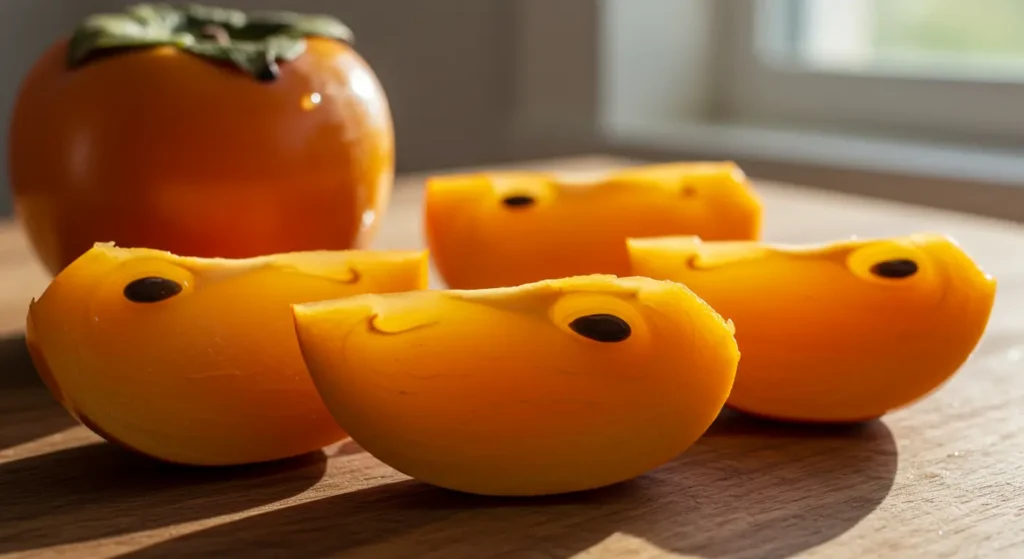
How Persimmons Fit Into a Healthy Bearded Dragon Diet
Bearded dragons need a balanced diet mainly made of vegetables, insects, and occasional fruits. Persimmons can be considered a treat rather than a staple food. Their vitamins and fiber add some nutritional value, but the sugar content means they should be fed sparingly. Including persimmons occasionally can provide variety and enrichment for your pet. It’s important to prepare the fruit properly—wash, peel, and remove seeds to avoid choking hazards. Feeding persimmons in small portions helps prevent digestive upset. Alongside persimmons, offer leafy greens and protein sources to maintain balance. Remember, fruits should make up less than 10% of your bearded dragon’s overall diet. By feeding persimmons thoughtfully, you add healthy diversity without risking nutrition imbalance.
Common Questions About Feeding Persimmons to Bearded Dragons
Many bearded dragon owners ask if persimmons are safe to feed. The main concern is the presence of tannins, which can cause digestive problems. Owners also worry about sugar levels and possible allergic reactions. Another common question is how often persimmons should be given. The answer is: only occasionally, as a treat, not a daily food. People often wonder if they need to peel or seed persimmons before feeding. It’s best to peel and remove seeds to avoid digestive issues or choking. Lastly, many ask if persimmons can replace other fruits or vegetables. They should not replace staple foods but can be part of a varied diet. Understanding these points helps you feed persimmons safely and confidently.
Benefits of Feeding Persimmons to Bearded Dragons: Nutrients and Health Effects
Persimmons offer more than just a sweet treat for bearded dragons—they also provide valuable nutrients that support their health. In this section, we’ll explore the key vitamins and minerals in persimmons and how they benefit your pet’s well-being.
Essential Vitamins and Minerals in Persimmons for Reptile Health
Persimmons contain several vitamins and minerals that can support a bearded dragon’s health. They are rich in vitamin A, which is crucial for vision, skin health, and immune function. Vitamin C in persimmons helps with healing and strengthens the immune system. The fruit also provides potassium, important for muscle function and nerve signaling. Manganese, another mineral found in persimmons, aids in bone development and metabolism. While these nutrients are beneficial, the amounts in persimmons are relatively modest compared to other vegetables and insects. Therefore, persimmons should complement, not replace, core foods in a bearded dragon’s diet. Feeding small, occasional servings ensures your pet gets these vitamins without excess sugars or other risks.
Antioxidant Benefits of Persimmons for Bearded Dragons’ Immune System
Persimmons are a good source of antioxidants, which help protect cells from damage caused by free radicals. These antioxidants support a strong immune system, helping your bearded dragon fight off infections and diseases. Vitamin C and beta-carotene in persimmons act as powerful antioxidants. Beta-carotene also converts to vitamin A, boosting overall health. Including antioxidant-rich foods like persimmons can contribute to longer, healthier lives for your pets. However, moderation is key. Too much fruit sugar can have negative effects. Using persimmons occasionally as a treat helps your bearded dragon enjoy antioxidant benefits without compromising its diet balance.
Persimmons’ Fiber and Hydration Effects on Bearded Dragon Digestion
The fiber in persimmons aids in healthy digestion by promoting regular bowel movements and preventing constipation. This is important for bearded dragons, as digestive issues can quickly become serious. Persimmons also have a high water content, which helps keep your pet hydrated, especially during warmer months. Proper hydration supports digestion and overall health. However, feeding too much persimmon can cause loose stools due to its fiber and water content. To avoid digestive upset, offer persimmons in small portions and combine them with other fiber-rich vegetables. This ensures your bearded dragon benefits from improved digestion and hydration without side effects.
Can Bearded Dragons Eat Persimmons Safely? Risks and Precautions to Know
While persimmons offer some benefits, it’s important to be aware of the risks when feeding them to bearded dragons. This section covers the potential dangers and precautions you should take to ensure your pet stays healthy and safe.
Understanding Tannins in Persimmons and Their Effects on Bearded Dragons
Tannins are natural compounds found in persimmons, especially when they are unripe. These substances can interfere with digestion in bearded dragons by binding to proteins and other nutrients. Consuming too many tannins may cause stomach upset, diarrhea, or nutrient absorption issues. That’s why it’s crucial to only feed ripe persimmons, which have much lower tannin levels. Removing the skin and seeds can also reduce tannin intake. By being careful about the ripeness and preparation, you can minimize the risks tannins pose and keep your bearded dragon healthy.
Sugar Content in Persimmons and Its Impact on Bearded Dragon Health
Persimmons contain natural sugars, which give the fruit its sweet taste. While these sugars provide quick energy, too much sugar can lead to health problems in bearded dragons. Excess sugar may cause obesity, digestive upset, and metabolic issues over time. Bearded dragons have a low tolerance for sugary foods, so it’s important to offer persimmons only as an occasional treat. Feeding small amounts ensures your pet enjoys the flavor without risking sugar-related problems. Always balance fruit treats with a diet rich in vegetables and insects.
Warning Signs: How to Detect Negative Reactions from Persimmons
It’s important to monitor your bearded dragon after introducing persimmons to their diet. Watch for signs of digestive distress like diarrhea, bloating, or constipation. Changes in appetite or lethargy can also indicate an adverse reaction. If your dragon shows any of these symptoms, stop feeding persimmons immediately and consult a reptile veterinarian. Early detection of problems helps prevent more serious health issues. Starting with small amounts and observing your pet’s response is the safest way to introduce new foods like persimmons.
How to Feed Persimmons to Bearded Dragons: Safe Preparation and Serving Tips
Feeding persimmons to your bearded dragon requires careful preparation to ensure safety and digestion. In this section, we’ll cover how to properly prepare and serve persimmons, plus tips on portion sizes and feeding frequency.
Preparing Persimmons: Washing, Peeling, and Cutting for Bearded Dragons
Proper preparation of persimmons is essential before feeding them to your bearded dragon. Always start by thoroughly washing the fruit to remove pesticides or dirt. Next, peel the skin off, as it can be tough and may contain higher tannin levels. Removing the skin helps prevent digestive issues. After peeling, cut the persimmon into small, bite-sized pieces that are easy for your bearded dragon to eat. Make sure to remove all seeds to avoid choking hazards or digestive problems. Proper preparation ensures that your pet enjoys persimmons safely and comfortably.
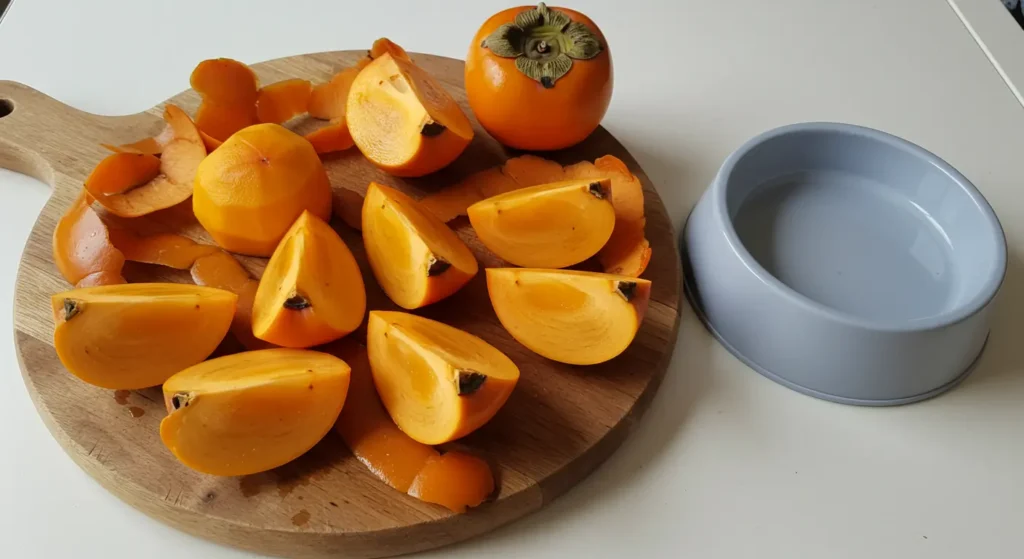
Recommended Serving Sizes and Feeding Frequency of Persimmons
When feeding persimmons to your bearded dragon, moderation is key. Offer only small portions—about one or two small pieces per feeding. Since persimmons are high in natural sugars, they should be considered an occasional treat rather than a regular food source. Feeding persimmons once or twice a week is generally safe, but always monitor your dragon’s reaction. Avoid overfeeding to prevent digestive upset or weight gain. Keeping serving sizes small and infrequent helps maintain a balanced and healthy diet for your pet.
Combining Persimmons with Other Safe Fruits and Vegetables for Bearded Dragons
Persimmons can be part of a varied diet when combined with other safe fruits and vegetables. Pair them with leafy greens like collard greens, mustard greens, or dandelion leaves, which provide essential vitamins and calcium. Other safe fruits include blueberries, strawberries, and mango, but remember to offer fruits sparingly. Mixing persimmons with nutrient-rich veggies helps balance sugar intake and supports your bearded dragon’s overall health. Always introduce new foods gradually and observe your pet’s response to ensure digestion remains healthy.
Best Fruits and Treats for Bearded Dragons Besides Persimmons
While persimmons can be a tasty treat, there are many other fruits that bearded dragons can enjoy safely. This section highlights some of the best alternative fruits and treats to keep your pet happy and healthy.
Safe and Healthy Fruit Alternatives for Bearded Dragons
Besides persimmons, there are several other fruits that make safe and healthy treats for bearded dragons. Blueberries, strawberries, and mangoes are popular choices because they are rich in vitamins and antioxidants. Apples (peeled and seedless) are also safe in small amounts. However, it’s important to remember that fruits should only be offered occasionally due to their sugar content. Always introduce new fruits slowly and monitor your pet for any adverse reactions. Providing a variety of safe fruits helps keep your bearded dragon interested and nourished.
Balancing Your Bearded Dragon’s Diet with Fruits, Veggies, and Insects
A balanced diet is vital for your bearded dragon’s health. Fruits like persimmons should make up less than 10% of their overall diet. The majority should be vegetables such as leafy greens and squash, which provide essential vitamins and calcium. Protein sources like crickets, mealworms, and dubia roaches are also important for growth and energy. Feeding a mix of fruits, vegetables, and insects ensures your bearded dragon receives a wide range of nutrients. This balance supports healthy digestion, strong bones, and a robust immune system.
Nutritional Supplements to Support Your Bearded Dragon’s Health
Even with a balanced diet, supplements can help fill nutritional gaps. Calcium powder with vitamin D3 is essential to prevent metabolic bone disease. Multivitamin supplements can also support overall health, especially for dragons with limited exposure to natural sunlight. When feeding fruits like persimmons, supplements ensure your pet gets enough calcium despite the fruit’s low calcium content. Always follow your veterinarian’s advice on supplement type and frequency. Proper supplementation helps maintain your bearded dragon’s health and vitality.
Conclusion:can bearded dragons eat persimmons
So, can bearded dragons eat persimmons? The simple answer is yes, but with important considerations to keep your pet safe and healthy. Persimmons can provide a tasty and nutritious treat thanks to their vitamins, antioxidants, and fiber, which contribute positively to your bearded dragon’s overall well-being. However, it’s crucial to feed only ripe persimmons, prepared properly by peeling and removing seeds, to avoid harmful tannins and choking hazards.
Because persimmons are high in natural sugars, they should be offered sparingly and never replace the core diet of leafy greens, vegetables, and insects. Overfeeding sugary fruits can lead to digestive upset and long-term health issues like obesity or metabolic problems. Monitoring your pet’s reaction when introducing persimmons is essential to detect any signs of adverse effects early.
In summary, by understanding the benefits and risks of persimmons and using them as an occasional treat, you can safely add variety and enjoyment to your bearded dragon’s diet. With careful preparation, portion control, and balance, persimmons can be a valuable addition that supports a happy, healthy reptile. Always remember, a well-rounded diet is the key to a thriving bearded dragon, and persimmons, when used wisely, fit perfectly into that equation.

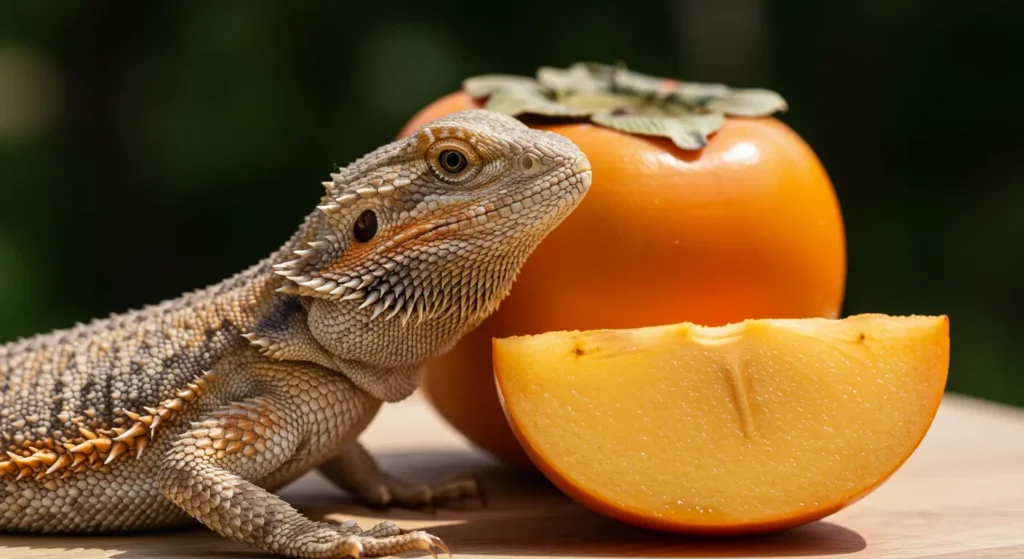
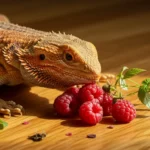
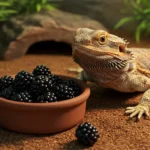
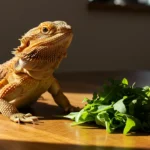
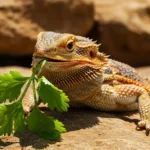
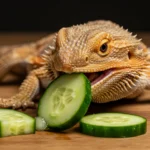
1 thought on “can Bearded Dragons Eat Persimmons? Benefits to Know”